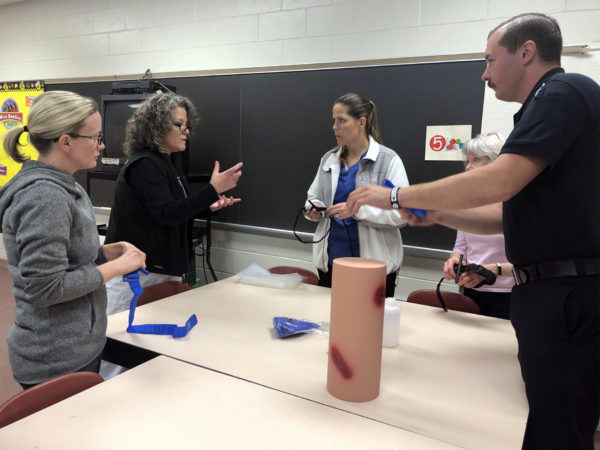SOUTHBRIDGE, MA, November 1, 2019 — With more than 40 combined years treating emergency room patients, Harrington Nurses Heather LaFlamme and Amanda White have seen their fair share of traumatic injuries.
So when they had an opportunity to educate others on how to help someone who was experiencing traumatic bleeding, they jumped at the chance.
White and LaFlamme are two of the lead trainers for the healthcare system’s ‘Stop the Bleed’ campaign.
Death from trauma, including post-traumatic bleeding, can occur in 3-5 minutes.
“When people hear the name of the training, they automatically think of a school shooting or another traumatic mass casualty situation,” White said. “But in reality, this training can help someone in need on any given day — from a lawn mowing accident to a mishap in a vocational school workshop.”
Stop the Bleed was, in fact, developed by medical professionals following the 2012 Sandy Hook school shootings. However, the program has since expanded into a national campaign to better prepare the public to save lives by raising awareness of basic actions to stop life-threatening bleeding following emergencies and natural disasters.

The program has been adopted and expanded by the Department of Homeland Security, now branded as “Until Help Arrives,” and includes several medical and security partners, including the American College of Surgeons, Committee on Trauma, Federal Bureau of Investigations and Department of Defense.
According to a 2016 National Academies of Science study, trauma is the leading cause of death for Americans under age 46. Life-threatening injuries require immediate action to prevent an injured person from dying.
“A training like Stop the Bleed is not just effective, but a critical tool to empower each other and be better prepared in the event of an emergency,” LaFlamme said.
Now, LaFlamme and White are taking their mission on the road. Their program structure is largely to “train the trainer”; a grassroots effort that encourages bystanders to become trained, equipped, and empowered to help in a bleeding emergency. The training includes an educational lecture and a hands-on demonstration.
So far, LaFlamme and White, along with Harrington Emergency Department Nurse Jason Osborne, have successfully educated and trained hundreds of individuals and multiple groups, including the Worcester Regional Medical Reserve Corps and a local group of Park Rangers affiliated with the Army Corps of Engineers.
Lois Luniewicz is the coordinator for the Worcester Regional Medical Reserve Corps, a group that recently received the training.
“[The team] did a phenomenal presentation and we are very grateful. They showed personal dedication toward advancing these life-saving techniques, as well as first-hand experiences,” she said.
All of Harrington’s 1,400 employees have been invited to become a Stop the Bleed certified trainer at sessions being held on campus during the month of November.
LaFlamme and White are also trying to establish relationships with local schools to train staff and faculty at all grade levels. This past spring, they taught the course to the Dudley/Charlton district school nurses.
“Many people don’t realize that you don’t need fancy medical equipment to save a life,” LaFlamme said. “We educate people on how to use what they have in front of them–the most basic everyday items can become life-saving tools in an emergency. That’s part of what makes this training so important.”
© 2024 UMass Memorial Health